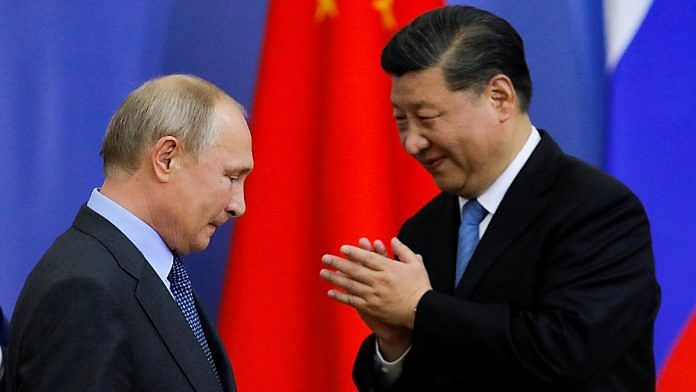Xi Jinping bet that establishing a “no limits” friendship with Vladimir Putin could prevent the U.S. from containing China. Now that agreement threatens to leave Beijing more isolated and alone.
A phone call between Xi and U.S. President Joe Biden on Friday appeared to achieve no major breakthroughs. The U.S. continued to threaten unspecified consequences if China provides support to Russia, and Beijing insisted it was supporting peace talks while blaming the U.S. for triggering the conflict.
That dynamic so far appears to be pushing more countries to the U.S. camp, with the European Union set to reinforce the American warning to Beijing at a virtual summit planned for April 1. China, meanwhile, is struggling to convince the world it’s a neutral player, as assurances to international audiences are undermined by messages at home affirming the China-Russia partnership.
The Communist Party’s reluctance to abandon Russia contains several key risks both for China and Xi personally. In the near term, it could hurt Beijing’s relations with key trading partners when it still needs investment and key technologies to meet its development goals. Perhaps more significantly, it could heap pressure on Xi and the Communist Party if the war ends up backfiring on Putin.
“Xi seems to feel it’s very important to have Russia as a strategic counterweight to the U.S., both diplomatically and militarily,” said Julian G. Ku, a professor of constitutional law at Hofstra University, who studies China and international law. “But if Putin is unseated, or if Russia is dramatically weakened, this undercuts Xi’s basic foreign policy strategy of aggressively asserting China’s interests against the U.S. and other countries.”
For now, Beijing is supporting Russia’s rationale for the war as it distances itself from the fighting, a position designed to support Russia while avoiding any U.S. sanctions that could hurt the Chinese economy. China’s envoy to the U.S., Qin Gang, on Sunday said China “will do everything” to de-escalate the war and that Beijing hadn’t sent “weapons and ammunition” to either side.
But just a day earlier Vice Foreign Minister Le Yucheng reiterated China’s stance that NATO’s eastward expansion served as the catalyst for Russia’s war, a view articulated during the Xi-Putin summit in Beijing last month before the Olympics. Moreover, Le equated that policy with the U.S.’s strategy in Asia.
“The Indo-Pacific strategy is as dangerous as the NATO strategy of eastward expansion in Europe,” Le told the Fourth International Forum on Security and Strategy. “If allowed to go on unchecked, it would bring unimaginable consequences, and ultimately push the Asia-Pacific into a fiery pit.”
Also read: China ‘will do everything’ to de-escalate war in Ukraine, diplomat says
‘Strategic checkmate’
Hu Xijin, former editor-in-chef of the Communist Party backed Global Times newspaper, made the case for why China should stick with Russia in a post on China’s Twitter-like Weibo, where he has some 24 million followers. Hu didn’t post the comments to his Twitter account, where he often defends China’s policies to an international audience, suggesting they were intended for domestic consumption.
Hu Xijin called Russia the “most important partner” for China as it seeks to force the U.S. to accept “peaceful coexistence” with the world’s second-biggest economy. He called it “naive” to advocate reconciliation with America, arguing that Washington wanted China to become divided and “controlled by the U.S.” similar to Japan, South Korea and Southeast Asian nations.
“If the U.S. successfully drives a wedge between China and Russia, Russia will immediately face a strategic checkmate,” Hu Xijin wrote. “In a future conflict between China and the U.S., China will also face a losing game.”
Censored viewpoints
China has censored opposing views from prominent state-backed researcher Hu Wei, a vice-chairman for the State Council-affiliated Public Policy Research Center, showing the consensus forming around the notion that Russia remains an indispensable partner. Hu Wei had advocated for a clear break from Russia “as soon as possible.”
“China’s top priority is to make appropriate strategic adjustments accordingly, to change the hostile American attitudes towards China, and to save itself from isolation,” he wrote in the piece, which is no longer accessible in China.
The rare debate over how China should interact with Russia added to signs that Beijing was caught off-guard by Putin’s invasion, which came shortly after his 38th official interaction with Xi during an in-person summit ahead of the Olympics. While there’s been “a narrative that Xi was played by Putin,” it’s likely that Communist Party leaders have “strong sympathy” for Russia’s actions, said Joseph Torigian, an assistant professor at American University.
Risk to Xi
“Beijing is too skeptical of American intentions, and Moscow and Beijing share too many common interests,” said Torigian, who has a forthcoming book on the power struggles in the Soviet Union and China after Josef Stalin and Mao Zedong. “However, Washington will likely try to both make that partnership as costly as possible for Beijing and convince the PRC to support Russia as little as possible.”
Xi personally has a lot at stake in the outcome. He’s expected to prolong his tenure at a twice-a-decade party congress later this year, and has mapped out plans to turn China into a leading world power by mid-century.
It’s unlikely that his support for Putin will derail Xi’s bid for a precedent-breaking third term in office, particularly since he has consolidated control of the party and it would only raise questions about China’s own political stability. But it could hurt China’s ability to reshape global institutions and prompt more countries to challenge Beijing’s own military assertiveness.
“Being associated with Putin’s failed invasion will undermine China’s reputation abroad, especially in Europe but also with its immediate neighbors in Asia,” said Ku from Hofstra University. “It will be harder for the Chinese to build trust and goodwill, which it was already losing.”- Bloomberg
Also read: Xi’s China isn’t just caught up with Ukraine, Taiwan. Someone’s disrupting Russia ties too



